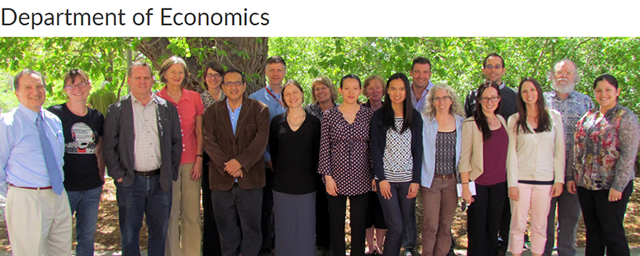
Economics ETDs
Publication Date
Summer 6-22-2023
Abstract
Using dairy farm data, this dissertation investigates the environmental and health implications of concentrated animal feeding operations (CAFOs) in New Mexico. It seeks to answer three primary research questions: (1) the relationship between environmental justice indicators and proximity to dairy farms; (2) the overall health consequences of dairy air pollutants; and (3) the viability of implementing an anaerobic digester (AD) system as a potential solution to externality concerns while maintaining dairy farm economic sustainability.
The first study demonstrates that foreign-born populations and Hispanics disproportionately experience emissions from CAFOs, with living near dairy farms or in areas with elevated ammonia levels linked to lower family income, fewer high school graduates, and higher poverty rates. These findings provide insights to inform policy decisions aimed at reducing environmental injustice, benefiting policymakers, stakeholders, and activists dealing with similar challenges in other regions.
The second study quantified the health damages caused by dairy air pollutants. The study determined that increased PM2.5 concentrations from dairy farm emissions resulted in 12.41 annual deaths, equivalent to $129 million in monetary terms. The primary pollutant responsible for these health damages was found to be ammonia, contributing 99.38% of the damages through its transformation into secondary PM2.5. This research is one of the first to quantify and monetize health costs related to dairy farms and suggests the need for expanded research to include other livestock types and geographical regions.
The third study evaluated potential solutions to address these challenges. We assessed the cost and revenue parameters of various AD systems and environmental incentive regimes, focusing on configurations with fiber and nutrient separation due to their large private and social benefits. Recommendations were provided to policymakers on how to address challenges such as high initial capital costs and the lack of markets for co-products to optimize net benefits for both private and public parties.
In conclusion, CAFOs impose substantial human health costs and contribute to global greenhouse gas emissions. However, an integrated approach utilizing AD systems can address both local pollution and global climate change concerns. Policymakers can foster the implementation of such systems through grants, low-interest loans, and assistance in establishing markets for AD co-products. Future research should include geographical extension of studies, lifecycle assessments of CAFOs, identification of optimal locations for dairy farms, comparative studies of large farms versus traditional farming methods, and investigations on the impact of further government regulations on dairy farm operations. This comprehensive assessment of environmental, health, and socioeconomic impacts of CAFOs will inform more sustainable and equitable policy decisions.
Degree Name
Economics
Level of Degree
Doctoral
Department Name
Department of Economics
First Committee Member (Chair)
Jingjing Wang
Second Committee Member
Robert Berrens
Third Committee Member
Benjamin Jones
Fourth Committee Member
Gabriel Pacyniak
Language
English
Keywords
Dairies, CAFO, Environmental Justice, Anaerobic Digester, Health Damage, PM2.5
Document Type
Dissertation
Recommended Citation
Ghimire, Suraj. "CONCENTRATED ANIMAL FEEDING OPERATIONS, ENVIRONMENTAL QUALITY AND PUBLIC HEALTH." (2023). https://digitalrepository.unm.edu/econ_etds/147
